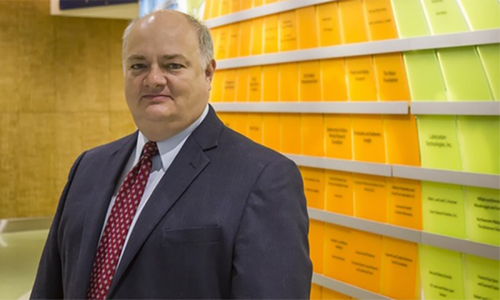
Recently, the National Organization for Rare Disorders (NORD) named M Health Fairview Masonic Children’s Hospital one of its initial cohort of institutions designated as Rare Disease Centers of Excellence. Each Center for Excellence was selected by NORD in a competitive application process requiring evidence of experience and expertise across multiple specialties to meet the needs of rare disease patients and a history of significant contributions to rare disease patient education, physician training and research.
This month, Rare Disease Day is on Feb. 28. The day is a time to spread awareness about these conditions and learn more about their impact on families across the United States. The University of Minnesota is hosting a virtual event on Feb. 25, 2022 called Successes & Challenges in Transition of Care for Rare Disorders. Dr. Paul Orchard with the University of Minnesota Medical School and an expert in rare diseases talks about rare disease conditions.
Q: What is a rare disease?
Dr. Orchard: The definition of a rare disease within the United States is a disorder affecting fewer than 200,000 people. However, there are about 7,000 rare diseases. It may sound like a rare disease doesn’t impact that many people, and on an individual disease basis that may be true. However, collectively there are a great many people with a rare disease. It’s estimated there are 30 million people in the United States with a rare disease, and 400 million worldwide.
Q: Why is it important to spread awareness about rare diseases?
Dr. Orchard: The implications for society are huge. One recent study published an analysis of the cost implications of rare diseases in the United States. It found that the economic impact of rare disease each year is close to a trillion dollars. That stems from healthcare costs, productivity loss, caretaking and much more. Even if you're not directly affected by a rare disease, it's important for us to tackle these conditions as a society.
Q: If a disease is rare, is it more difficult to treat?
Dr. Orchard: It depends. Some of the diseases are genetic and the ability to treat them can be very difficult. If you have a gene that isn't working correctly, it’s almost impossible with our current technology to cure every aspect of that disease. A small group of rare diseases have specific treatments, but many do not. In many cases, recognizing curing the disease is not likely, the goal of treatment is to help provide a better quality of life.
Many of the disorders also affect several aspects of the body. For example, rare diseases can affect the eyes, ears, heart, skeleton, lungs, sleeping and motor function. That means many care experts from different specialties are involved in the care of the patient. Rare diseases can require very collaborative care coordination to achieve the best outcomes.
Q: What advice would you give to the family of someone who was recently diagnosed with a rare disease?
Dr. Orchard: One of the challenges for families is locating a team who has expertise in their rare disease. For most rare diseases, you may not be able to find a group of providers in your geographic location who will be able to offer comprehensive care for your condition. You may find out that one of the better groups for treating your disease is not in your state, which will require you to travel, which can be difficult, and insurance coverage could be an issue. For a lot of these diseases, finding a multi-specialty group is very important.
Also, remember there are lots of advocacy groups out there for many rare diseases. Check out the web and see if there are support groups or other families you can connect with. NORD is an excellent resource. Minnesota also has recently formed a Rare Disease Advisory Council, and one of their goals is to help families navigate their diagnosis and seek out the best treatments.
Q: What does it mean to be classified as a Center of Excellence for rare diseases? Why is the designation important?
Dr. Orchard: We’re proud of the fact that NORD recently designated M Health Fairview Masonic Children’s Hospital a Center of Excellence, led by the Medical School’s Dr. Susan Berry. People travel to get treatment at the M Health Fairview from all over the world. We’ve assembled a group of providers who are experts in many rare diseases and can provide a comprehensive approach to the care families need. There are only 31 Centers for Excellence in the United States, so hopefully it’s a designation that helps families know that we are a good choice when you are looking for help with your care.
Dr. Paul Orchard is a pediatric blood and marrow transplant physician at the U of M Medical School and M Health Fairview. At the Medical School, he is the Medical Director of the Inherited Metabolic and Storage Disease Program. Dr. Orchard's research focus is in the use of hematopoietic stem cell transplantation and other cell therapies for inherited metabolic disorders, with a special interest in the inherited leukodystrophies, the mucopolysaccharidoses and osteopetrosis. His clinical research is in evolving new and combination therapies to decrease toxicity and improve outcomes, with a particular interest in the use of gene therapy approaches. In December 2021, Dr. Orchard made history when one of his patients, a 4-year-old girl from Alabama, became the first person in the United States to receive life-saving gene therapy for metachromatic leukodystrophy. She was treated last fall at M Health Fairview Masonic Children's Hospital.
-30-
About “Talking...with U of M”
“Talking...with U of M” is a resource whereby University of Minnesota faculty answer questions on current and other topics of general interest. Feel free to republish this content. If you would like to schedule an interview with the faculty member or have topics you’d like the University of Minnesota to explore for future “Talking...with U of M,” please contact University of Minnesota Public Relations at [email protected].
About the University of Minnesota Medical School
The University of Minnesota Medical School is at the forefront of learning and discovery, transforming medical care and educating the next generation of physicians. Our graduates and faculty produce high-impact biomedical research and advance the practice of medicine. Visit med.umn.edu to learn how the University of Minnesota is innovating all aspects of medicine
- Categories:
- Health
- Health conditions
- Medical




